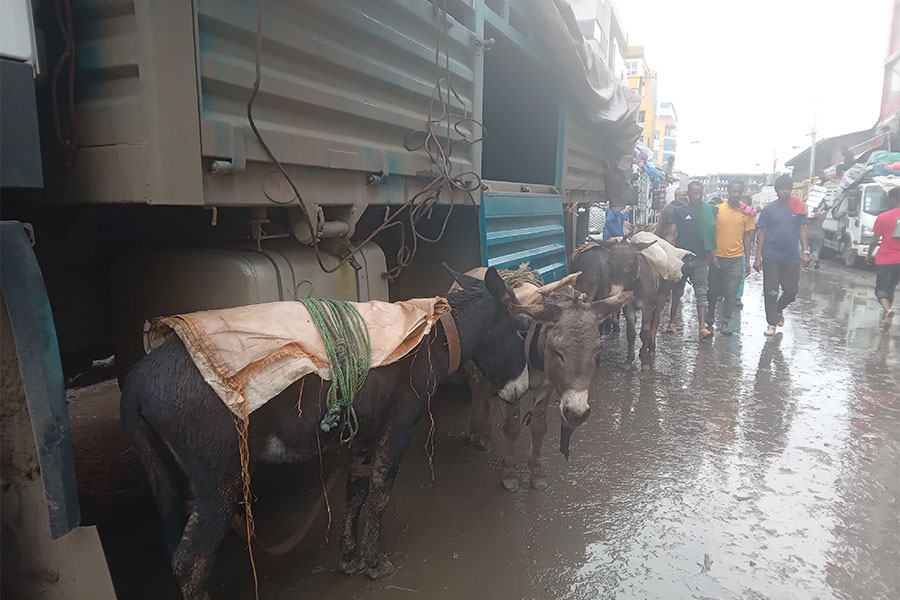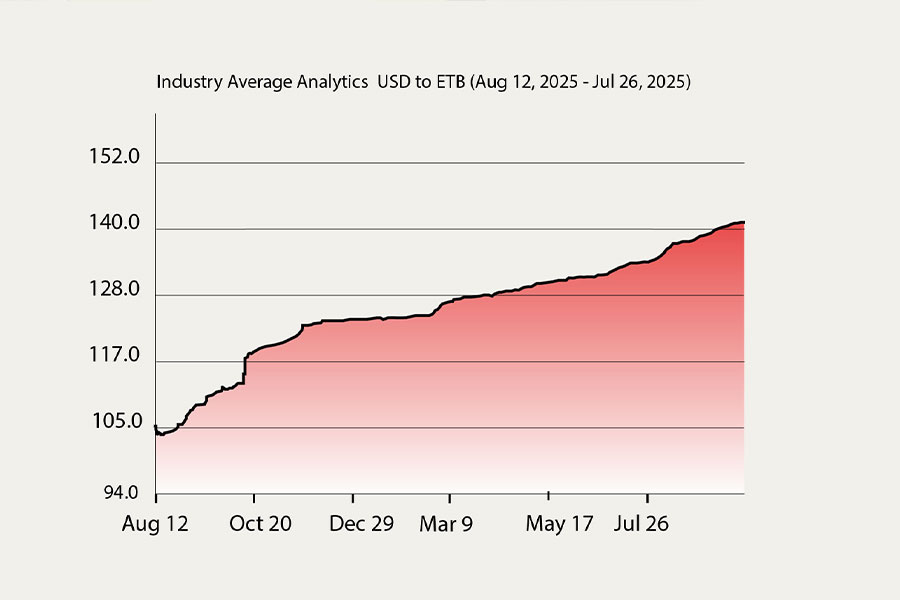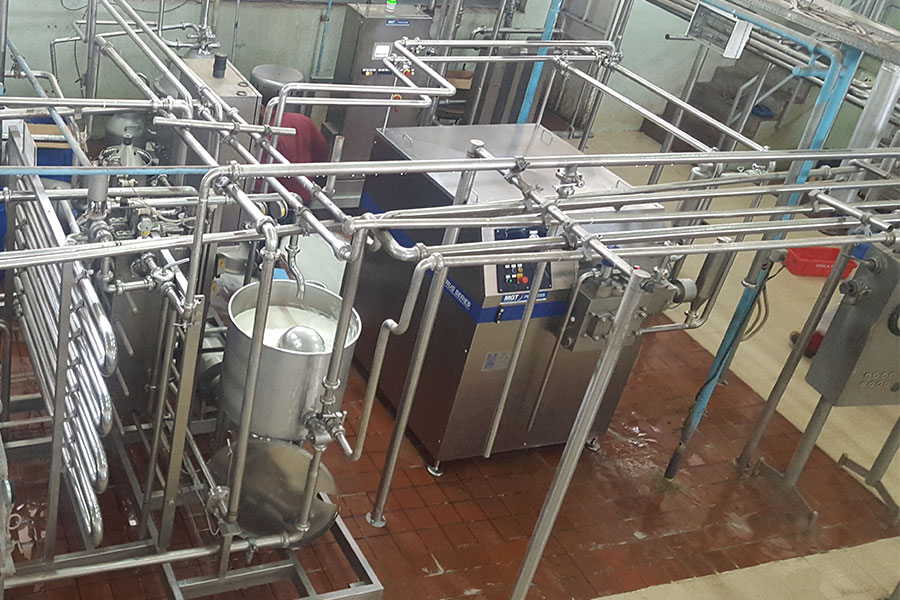
In-Picture | Aug 11,2024
The streets of Addis Abeba are as varied as they are many, although too many of them have yet to be named. From the narrow alleyways of the old Piassa to the boulevards of contemporary Bole and the belt road that encircles the city, the scene is constantly changing. However, what seems not to change as much is the collage of posters and brochures posted along these streets, advertising the services of countless brokers.
Worqineh Dejene, 41, is one of these brokers active in the capital. His life and vocation have been less than predictable. With a surge in demand in the property market in recent months, he usually spent his time running around, hunting down clients. Receiving dozens of phone calls from homebuyers and many of his partners and brokering deal after deal, days normally went quickly for him.
The last few weeks have been more reticent, however. Now idled, he reminisces about the hectic schedule he had just months ago.
"There was high demand from buyers, although the same could not have been said about the other side," said Worqineh.
A series of measures by city and federal authorities halted him in his tracks.
“You never know what's going to happen with this job,” Worqineh says.
There are enough reasons for him to be alarmed, with the situation unfolding in the country over the last three weeks. Decisions that wreak havoc on his work began on July 12, 2021, when the Documents Authentication & Registration Agency (DARA) limited its services in all its offices across the city, its officials claiming a system upgrade.
But two major developments followed a month later.
Authorities at the central bank forced all commercial banks to freeze collateral-based loans, a measure which its official hope would weaken those they accuse of working to "sabotage the economy." The collateral damage of such an abrupt decision communicated to the senior executives of the banks was the property market. Intermediaries like Worqineh remained the most affected as business went dead; a source of funds for homebuyers and builders dried up.
The sudden but shocking measure by the central bank was followed by the Addis Abeba City Mayor's Office, suspending the transfer of lease rights and related services until further notice.
Preparing dozens of letters was sufficient for city officials in ordering district administrations, the Land Development & Management Bureau and its subordinates to enforce the restriction, allegedly taken to curtail "illicit activities" in the property market. They have instructed them to suspend all but services approved by the city cabinet.
According to Zemen Junedin, head of the City Administration's press secretariat, the city administration was aware of widespread illegal landholdings and expansion works.
The Documents Authentication & Registration Agency has paused the transfer of title deeds for close to two months now.
"The administration won't tolerate any misuse," Zemen told Fortune.
These measures the central bank and the city administration have taken may appear to have come about separately. But they seem to be part of a coordinated effort by the authorities to crack down on activities they refer to as "economic sabotage."
Federal authorities have been alarmed by the sudden and sharp rise of the value of foreign currencies against the Birr. The parallel market began to offer a margin of up to 30 Br for a Dollar, increasing by three folds from its historical trend. While a Dollar was exchanged for 45 Br in the official market in mid-August 2021, the parallel market offered as high as 75 Br. The rate has dropped to 60 Br since, emboldening the officials that their actions have paid off.
The authorities blamed it on those who take loans from banks collateralising their properties, and taking the money out in foreign exchange through the parallel market. As a relief measure, the property market was targeted.
The Administration has been clamping down on land allocations over the years, zooming in 400 leasees blamed for misappropriation. In August 2018, during the reshuffle in the City Administration's cabinet, land-related services were temporarily suspended. Late last year, a temporary suspension on property transactions was enforced following the demonetisation of the Birr.
The latest suspension, the third since the coming to office of Prime Minister Abiy Ahmed's administration, would compel the public notary office not to resume providing services to the sale and transfer of properties, even upon completing the system upgrade.
"We'll recommence our work when the City Administration does [lift the suspention]," said Mulken Amare, a director at the Agency, which had authenticated and registered 196,436 property holdings last year, worth over two billion Birr in transactional value.
Along with land lease-related services, the provision of design and building permits has been suspended, leaving many in the consulting and contractor business in the cold.
The City Infrastructure Coordination, Building Permit & Control Authority is in charge of issuing these permits. According to its Director-General, Helawi Sewnet, the services were halted as issuing permits requires verifications on whether the property in question is frozen by a court or has loans unsettled with banks or arrears in tax.
Though such measures are meant to discourage "illegal transactions," it comes with a cost for the officials.
It caused great distress for the construction and housing industry, which has been growing as an economic base, closely tied with huge financial transactions, high employment and the expansion in the construction materials and equipment industry.
These restrictions have not only impacted the big players.
They put tremendous anxiety on the livelihood of over a million people making a living from the construction industry, contributing 21pc to the country's GDP with an annual growth rate of almost 15pc, the highest among all segments of the economy. Paralysing market players, including homeowners, buyers and brokers, the series of restrictions implemented by authorities have brought construction activities to a standstill.
Investors in the process of building properties or undertaking expansions have been forced to sit on a huge stash of cash. Developers that have spent years building properties have been disabled. The same is true for hundreds of sales that have recently been a common sight in main streets with the surge in business activities in the property market.
Amanuel Abdi is one of the casualties of this unpropitious development. Working as a consulting architect for the past three years, he has established his own firm, DOT Consulting Architects, developing architectural designs for clients, and processing the necessary construction permits. Amanuel's firm has up to seven design works pending on his desk, and at the various offices of the City Administration.
"Our source of revenue has dried up as we don't know when services will resume," said Amanuel, noting that this is the first time he has seen an indefinite suspension on permits. "We can't take on new projects."
The buck, however, does not stop with him. The owners of these pending projects will likely incur further costs due to delays in a market characterised by an incessant rise in construction materials prices. Amanuel could lose up to 40,000 Br a month on a project if the suspension continues, he estimates.
The banking industry has the most to lose. With the crackdown on the property market, managers of commercial banks have been disconnected from their clients in the construction industry, who make up 11pc of 1.2 trillion Br in outstanding credit supplied by the financial institutions thus far. This could be of little surprise for the industry players, considering their losses since the imposition of loan freeze, a decision that has forced them to pay interest to depositors without income from loans.
"We didn't feel the impact of the property market on our business due to blanket measures applied on all borrowers," said an executive at one of the private banks.
He, however, admitted that the suspension of services on property transfers has prevented banks from foreclosing.
"We are extending the repayment period instead of foreclosing on the properties of those who have defaulted on their loans, considering the economic challenges" said this executive.
Big players in the real estate market are beginning to feel the pinch.
With about 20 projects, Flintstone Homes has seen sales dropping lately, Moges Tadesse, general manager, disclosed.
The housing market was shooting up recently, likely due to people wanting to acquire assets to guard their cash against the runaway inflation. In July, headline inflation stood at a decade high of 26.4pc.
"Sales were increasing especially when we introduced a long-term payment scheme," said Moges.
The ban on collateralised loans has discouraged buyers who wanted to have options.
Leul Dereje has served as a marketing executive, deputy manager and sales consultant for several real estate companies, closely following the real estate market for almost six years. The new measures have prevented new real estate projects from beginning work. Although the effect is rather small for real estate firms selling unfinished homes, he observes it has sown a general feeling of uncertainty.
"It'll create the ground for corruption, as property buyers and sellers look for ways to bypass long queues when the services go back to normal," he warns.
People who had been in the market looking to buy properties are also in a pickle.
A woman, whose name is being withheld upon request, employed at one of the private commercial banks, put a downpayment of 100,000 Br on the house she has been eyeing in the Karakore neighbourhood of Kolfe-Qeranio District. She was awaiting the approval of a loan to pay out the remaining four million Birr for the property. It turns out to be a dream cut short. With less than a month to pay the full amount, the ban on loans and the suspension on property transfers mean she can do little but hope the measures are reconsidered by the authorities soon enough.
It appears that she and many buyers facing similar troubles will have to wait longer.
Recently, the Addis Abeba City Administration formed a committee to undertake a study to identify problems and propose long-lasting solutions for the property market, which it characterises as falling into the hands of a few officials are blaming for undermining the economy.
For Leul, the rationale of the measure is understandable as noticeable illicit activities were happening in the market. However, he would want to see the Administration contain the damage, conduct its assessment in time, and impose selectively.
"It shouldn't come at the cost of the rest of us," he said.
The study will determine the fate of many, though when that will happen remains unclear. Time will tell whether it could aggravate the biggest fear of homebuyers – soar in the prices of properties.
PUBLISHED ON
Aug 28,2021 [ VOL
22 , NO
1113]

In-Picture | Aug 11,2024

Agenda | Dec 01,2024

Commentaries | Jul 31,2021

Money Market Watch | Oct 05,2025

Radar | Dec 26,2020

Fortune News | Jun 08,2019

Radar | Jul 13,2024

Radar | Oct 14,2023

Fortune News | Jan 14,2023

Fortune News | Nov 24,2024

Dec 22 , 2024 . By TIZITA SHEWAFERAW
Charged with transforming colossal state-owned enterprises into modern and competitiv...

Aug 18 , 2024 . By AKSAH ITALO
Although predictable Yonas Zerihun's job in the ride-hailing service is not immune to...

Jul 28 , 2024 . By TIZITA SHEWAFERAW
Unhabitual, perhaps too many, Samuel Gebreyohannes, 38, used to occasionally enjoy a couple of beers at breakfast. However, he recently swit...

Jul 13 , 2024 . By AKSAH ITALO
Investors who rely on tractors, trucks, and field vehicles for commuting, transporting commodities, and f...

Oct 18 , 2025
The political establishment, notably the ruling party and its top brass, has become p...

Oct 11 , 2025
Ladislas Farago, a roving Associated Press (AP) correspondent, arrived in Ethiopia in...

Oct 4 , 2025
Eyob Tekalegn (PhD) had been in the Governor's chair for only weeks when, on Septembe...

Sep 27 , 2025
Four years into an experiment with “shock therapy” in education, the national moo...